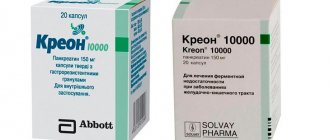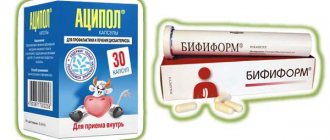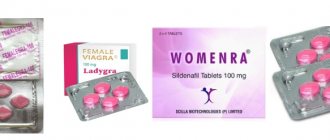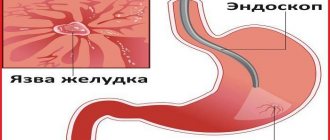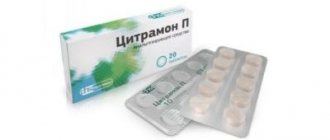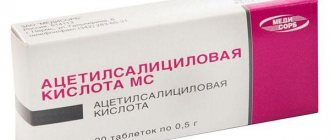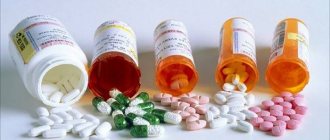Indications for use
Due to the properties of acetylsalicylic acid, the medicine has analgesic, anti-inflammatory, and antipyretic effects. Aspirin Upsa quickly helps with:
- Pain of various etiologies
- Inflammatory processes
- Feverish conditions, high temperature
- Colds and infectious diseases.
The high effectiveness of Aspirin Upsa is also due to the form of the tablets. Their use in dissolved form protects the gastrointestinal tract from damage by acetylsalicylic acid, since in this form it cannot return to its original (undissolved) form after interaction with the acidic gastric environment, and therefore does not settle on the walls of the organ. Therefore, the drug not only acts quickly, but is also more gently tolerated compared to conventional pills.
Upsarin Upsa effervescent tabs 500 mg No. 16 40946
Description
Round, flat white tablets with beveled edges and a score on one side. When dissolved in water, the release of gas bubbles is observed. It has anti-inflammatory, analgesic and antipyretic effects associated with the suppression of COX-1 and -2, which regulate the synthesis of PG. Reduces platelet aggregation, adhesiveness and thrombus formation by suppressing the synthesis of thromboxane A2 in platelets. The antiaggregation effect persists for 7 days after a single dose (more pronounced in men than in women). Dissolving in water, the Upsarin Upsa tablet forms a buffer solution, which, after taking the drug, maintains the active substances in dissolved form, preventing them from contacting the acidic environment of the stomach to go back into an undissolved form and precipitate in the form of solid particles on its walls. The result is faster and more complete absorption of the drug, as well as better tolerability compared to conventional acetylsalicylic acid tablets. Acetylsalicylic acid reduces the excretion of uric acid from the body, which can cause an acute attack of gout in predisposed patients. With long-term use of the drug, a complete blood count and stool test for occult blood should be periodically performed, and the functional state of the liver should be monitored. Before surgery, to reduce bleeding during surgery and the postoperative period, you should stop taking the drug 5-7 days in advance and notify the doctor. Children should not be prescribed medications containing acetylsalicylic acid, since in the case of a viral infection the risk of Reye's syndrome increases. Symptoms of Reye's syndrome are prolonged vomiting, acute encephalopathy, and liver enlargement. If it is necessary to use the drug during lactation, breastfeeding should be discontinued. Patients on a salt-free or low-salt diet should take into account that each tablet of the drug contains 388.5 mg (16.9 mEq) of sodium.
Compound
Tablets for preparing an effervescent drink 1 tablet. active substance: acetylsalicylic acid 500 mg excipients: anhydrous citric acid; sodium carbonate anhydrous; sodium bicarbonate; sodium citrate anhydrous; aspartame; povidone; crospovidone; natural orange flavor in strips 4 pcs.; There are 4 or 25 strips in a box.
Application
pain syndrome (moderate or mild) of various origins in adults: headache (including those associated with alcohol withdrawal syndrome), toothache, migraine, neuralgia, thoracic radicular syndrome, muscle and joint pain, pain during menstruation; increased body temperature during colds and other infectious and inflammatory diseases (in adults and children over 15 years of age). In recommended doses, the drug is usually well tolerated. In rare cases, the following side effects may occur: - allergic reactions: skin rash, bronchospasm, Quincke's edema; — formation based on the hapten mechanism of the “aspirin” triad (a combination of bronchial asthma, recurrent polyposis of the nose and paranasal sinuses and intolerance to acetylsalicylic acid and pyrazolone drugs); - gastrointestinal disorders: nausea, vomiting, pain in the epigastric region, diarrhea (diarrhea), gastrointestinal bleeding (vomiting like “coffee grounds”, black tarry stools; decreased appetite, increased activity of liver transaminases; - impaired renal function; - thrombocytopenia, anemia, leukopenia, hyperbilirubinemia; - hemorrhagic syndrome (nosebleeds, bleeding gums), increased blood clotting time. If any side effects occur, you must immediately stop taking the drug and inform your doctor. Acetylsalicylic acid increases the toxicity of methotrexate, the effects of narcotic analgesics , other NSAIDs, oral hypoglycemic drugs, heparin, indirect anticoagulants, thrombolytics and platelet aggregation inhibitors, sulfonamides (including co-trimoxazole), triiodothyronine; reduces the toxicity of uricosuric drugs (benzbromarone, sulfinpyrazone), antihypertensive drugs and diuretics (spironolactone, furosemide). GCS, alcohol and drugs containing alcohol increase the damaging effect on the gastrointestinal mucosa and increase the risk of developing gastrointestinal bleeding. Acetylsalicylic acid increases the concentration of digoxin, barbiturates and lithium drugs in the blood plasma. Antacids containing magnesium and/or aluminum hydroxide slow down and impair the absorption of acetylsalicylic acid. Orally, after dissolving the tablet(s) in a glass (200 ml) of water or juice. Adults and children over 15 years old take 1 tablet. (500 mg) up to 6 times a day. For severe pain and high temperature - 2 tablets. (1 g); the maximum daily dose should not exceed 6 tablets. (3 g). Elderly patients - 1 table. (500 mg) up to 4 times a day; the maximum daily dose should not exceed 4 tablets. (2 g). Frequency and time of administration: the interval between doses of the drug should be at least 4 hours. Regular adherence to the drug regimen allows you to avoid a sharp increase in temperature and reduce the intensity of the pain syndrome. The duration of treatment (without consulting a doctor) should not exceed 5 days when prescribed as an analgesic and more than 3 days - as an antipyretic. Symptoms: in the initial stage of poisoning - central nervous system stimulation, dizziness, severe headache, decreased hearing acuity, impaired vision, nausea, vomiting, increased breathing. Later, depression of consciousness occurs, including coma, respiratory failure, and disturbances in water and electrolyte metabolism. Treatment: induction of vomiting, gastric lavage, administration of activated charcoal and laxative. Treatment should be carried out in a specialized department. Hypersensitivity to acetylsalicylic acid, other NSAIDs and components of the drug; erosive and ulcerative lesions (in the acute phase) of the gastrointestinal tract, gastrointestinal bleeding; severe liver or kidney dysfunction; aspirin asthma; hemorrhagic diathesis (hemophilia, von Willebrand disease, telangiectasia, hypoprothrombinemia, thrombocytopenia, thrombocytopenic purpura); dissecting aortic aneurysm; portal hypertension; vitamin K deficiency; deficiency of glucose-6-phosphate dehydrogenase, phenylketonuria; pregnancy (I and III trimester); breastfeeding period. The drug is not prescribed to children under 15 years of age with acute respiratory diseases caused by viral infections due to the risk of developing Reye's syndrome (encephalopathy and acute fatty liver degeneration with acute development of liver failure). With caution - hyperuricemia, urate nephrolithiasis, gout, peptic ulcer of the stomach and/or duodenum (history), decompensated heart failure.
Possible product names
- Upsarin Upsa effervescent tabs 500mg No. 16
- UPSARIN UPSA 500 MG EFFERKING. TAB. No. 16
- (Upsarin UPSA) Upsarin Upsa effervescent tablets 500 mg No. 16
Medicinal properties
Aspirin in effervescent tablets is absorbed faster than a similar drug, but in its usual form. The highest concentration in the blood is formed 10-40 minutes after administration. The active substance is hydrolyzed to form salicylic acid, which also has a therapeutic effect. Both components quickly spread throughout the body, cross the placental barrier, and are excreted in milk.
Acetylsalicylic acid is converted in the liver, its metabolites are excreted in the urine.
Mode of application
Aspirin Upsa instructions for use advise use only from 15 years of age. The effervescent pill is dissolved in 200 ml of boiled water immediately before use. The highest permissible daily dose for people whose weight is more than 50 kg is 3 g (or 6 tablets).
- Usually one effervescent tablet is taken at a time; it can be taken again only after 4 hours. In acute conditions (severe pain or high temperature), it is allowed to take two pills at a time.
- For older people, the daily dose is 2 g of the substance (or 4 tablets).
- For patients suffering from kidney or liver dysfunction, the dosage of Aspirin Upsa is reduced or the time interval between doses is increased.
In the absence of medical prescriptions and self-administration of the medicine, the duration of the course of Aspirin Upsa as an antipyretic should not last more than 3 days, and as an analgesic - not exceed 5.
Directions for use and dosage
Aspirin UPSA can be taken by children over 15 years of age and adults, 1 tablet up to 6 times a day with an interval of at least 4 hours between doses. Before use, the tablet should be dissolved in a glass of water or juice at room temperature.
At the beginning of the disease, with severe pain and high temperature, you can take 2 tablets at a time, but no more than 6 pieces per day, for older people - no more than 4. As an antipyretic drug, Aspirin UPSA is taken for 3 days, as an analgesic - up to 5 days.
In case of an overdose, symptoms of central nervous system excitation, vomiting, severe headache, dizziness, nausea, decreased hearing acuity, blurred vision and increased breathing may first appear, after which respiratory failure, depression of consciousness up to coma and disturbances in water-electrolyte metabolism may develop.
Caution should be exercised when using Aspirin UPSA together with glucocorticoids and ethanol, since the latter increase the effect of acetylsalicylic acid on the mucous membrane of the gastrointestinal tract, thereby increasing the risk of gastrointestinal bleeding.
During pregnancy and pregnancy
Preparations with acetylsalicylic acid cannot be used during these periods, especially for women in the 1st or 2nd trimester, due to the high risk of pathologies in the fetus (cleft palate, abnormalities of heart formation). In case of urgent need, doses should be as small as possible, and use should be short-term, carried out under the supervision and responsibility of a doctor.
In the 3rd trimester, acid is categorically contraindicated, as it can contribute to post-term pregnancy, weak labor, and impaired renal function in the child, leading to the development of failure.
In addition, acid can cause heavy and prolonged bleeding in the mother or fetus. Moreover, small doses of aspirin also cause them. Large doses of acid used at the end of pregnancy lead to the development of intracranial bleeding. Premature babies are especially susceptible to this.
Breastfeeding women should also give up Aspirin Upsa, since acetylsalicylic acid has the ability to penetrate into milk.
Upsarin Upsa
Nausea, loss of appetite, gastralgia, diarrhea; allergic reactions (skin rash, angioedema, bronchospasm); impaired liver and/or kidney function; thrombocytopenia, anemia, leukopenia, Reye's syndrome (encephalopathy and acute fatty liver with rapid development of liver failure), formation of “aspirin” aspirin based on the hapten mechanism (a combination of bronchial asthma, recurrent nasal polyposis and paranasal sinuses and intolerance to ASA and pyrazolone-type drugs) .
With long-term use - dizziness, headache, vomiting, erosive and ulcerative lesions of the gastrointestinal tract, hypocoagulation, bleeding (including in the gastrointestinal tract); visual impairment, decreased hearing acuity, tinnitus, bronchospasm, interstitial nephritis, prerenal azotemia with increased creatinine in the blood and hypercalcemia, papillary necrosis, acute renal failure, nephrotic syndrome, aseptic meningitis, increased symptoms of CHF, edema, increased activity of the liver » transaminases.
Overdose. Symptoms (single dose less than 150 mg/kg - acute poisoning is considered mild, 150-300 mg/kg - moderate, more than 300 mg/kg - severe): salicylic syndrome (nausea, vomiting, tinnitus, blurred vision, dizziness, severe headache, general malaise, fever - a poor prognostic sign in adults). Severe poisoning - hyperventilation of the lungs of central origin, respiratory alkalosis, metabolic acidosis, confusion, drowsiness, collapse, convulsions, anuria, bleeding. Initially, central hyperventilation of the lungs leads to respiratory alkalosis - shortness of breath, suffocation, cyanosis, cold sticky sweat; with increasing intoxication, respiratory paralysis and uncoupling of oxidative phosphorylation increase, causing respiratory acidosis.
In chronic overdose, the concentration determined in plasma does not correlate well with the severity of intoxication. The greatest risk of developing chronic intoxication is observed in elderly people when taking more than 100 mg/kg/day for several days. In children and elderly patients, the initial signs of salicylicism are not always noticeable, so it is advisable to periodically determine the concentration of salicylates in the blood: a level above 70 mg% indicates moderate or severe poisoning; above 100 mg% - extremely severe, prognostically unfavorable. Moderate poisoning requires hospitalization for 24 hours.
Treatment: provocation of vomiting, administration of activated carbon and laxatives, constant monitoring of CBS and electrolyte balance; depending on the metabolic state - administration of sodium bicarbonate, sodium citrate solution or sodium lactate. Increasing reserve alkalinity enhances the excretion of ASA due to alkalinization of urine. Alkalinization of urine is indicated when the level of salicylates is above 40 mg% and is provided by intravenous infusion of sodium bicarbonate (88 mEq in 1 liter of 5% dextrose solution, at a rate of 10-15 ml/h/kg); restoration of bcc and induction of diuresis is achieved by administering sodium bicarbonate in the same doses and dilution, which is repeated 2-3 times. Caution should be exercised in elderly patients in whom intensive fluid infusion may lead to pulmonary edema. The use of acetazolamide for alkalinization of urine is not recommended (it can cause acidemia and enhance the toxic effect of salicylates). Hemodialysis is indicated when the salicylate level is more than 100-130 mg%, in patients with chronic poisoning - 40 mg% or lower if indicated (refractory acidosis, progressive deterioration, severe central nervous system damage, pulmonary edema and renal failure). For pulmonary edema - mechanical ventilation with an oxygen-enriched mixture.
Contraindications
Aspirin should not be taken if there is individual hypersensitivity to the active or auxiliary components, as well as with:
- Children's age (up to 15 years)
- Bronchial asthma
- Heart failure
- Predisposition to bleeding
- Acute form of peptic ulcer and duodenal ulcer
- Severe pathologies of the kidneys and liver
- Portal hypertension
- Hemophilia
- Aspirin asthma
- Hypovitaminosis K
- Low level of gastric acidity
- Low calcium content
- Dissecting aortic aneurysm
- Pregnancy and breastfeeding.
Contraindications for Aspirin
Prohibitions on taking Aspirin are divided into two types:
- Relative
- Absolute
Taking Aspirin is strictly prohibited if you are allergic to acetylsalicylic acid or other non-steroidal anti-inflammatory drugs. In addition to all this, the drug should not be used if there is an increased tendency to bleeding.
Relative contraindications:
- Bronchial asthma
- Combined use of anticoagulants
- Breast-feeding
- Pregnancy
- Chronic stomach diseases
- Kidney dysfunction
- Diabetes
- Age up to 12 years
If there are relative prohibitions, taking the medicine is possible only after approval by the doctor.
Precautionary measures
With a long course of Aspirin Upsa, it is necessary to systematically do blood and stool tests and check the condition of the liver.
- In patients with gout, the drug may cause an exacerbation due to the ability of acetylsalicylic acid to inhibit urinary excretion.
- For patients undergoing surgery, the drug should be discontinued to reduce bleeding during and after surgery.
- People who control their salt intake should remember that it is present in Aspirin Upsa.
Pharmacodynamics and pharmacokinetics
The main component of the medicine is acetylsalicylic acid (some mistakenly call it acetylic acid). The pharmaceutical drug belongs to anti-inflammatory medications.
It is useful to know that Aspirin and acetylsalicylic acid are the same thing.
C9H8O4 is the chemical formula of Aspirin.
Taking Aspirin in a dosage of 300 mg to 1 mg helps eliminate joint and muscle pain. In addition, a similar dose of the drug helps to improve well-being during colds and flu, and helps with fever.
Acetylsalicylic acid is suitable for the treatment of acute and chronic inflammatory diseases.
It is advisable to take aspirin for:
- Bekhterov's diseases
- Osteoarthritis
- rheumatoid arthritis
For the above diseases, doctors prescribe higher doses of the drug than when fighting colds and high body temperature. Based on the specific course of the disease, patients are prescribed 4-8 g of medication per day.
Aspirin is also useful to take in the presence of many vascular diseases. In such cases, doctors recommend taking from 75 g to 300 mg of the substance daily (depending on the nature and danger of the disease).
Pharmacokinetics
After consuming the medicine, the active substance is rapidly and completely absorbed from the stomach. During and after absorption, it is converted to salicylic acid (the main active metabolite).
Decomposition products are primarily excreted through the kidneys.
Cross-drug interactions
If there is a need for other medications, then the course of Aspirin Upsa should be carried out with caution, since acetylsalicylic acid reacts with their components and distorts the properties. Therefore, it is imperative to inform your doctor about the medications you are taking.
- Aspirin enhances the properties of antidiabetic and anticonvulsant drugs, diuretics.
- When combined with alcohol-containing drugs or alcohol, damage to the mucous membranes of the gastrointestinal tract and the intensity and duration of internal bleeding increases.
- Aspirin should not be used with oral anticoagulants, due to the weakening of the latter's effect and increased risk of bleeding. If use is necessary, it is necessary to constantly check the level of blood clotting.
- Preparations containing magnesium, aluminum, and calcium salts accelerate the elimination of salicylates.
Side effects
If you follow the doses recommended by manufacturers or doctors, side effects usually do not develop, but they cannot be excluded:
- Manifestations of allergies - skin and respiratory (up to Quincke's edema or bronchospasm)
- Aspirin triad
- Abnormal bowel movements, abdominal pain, internal bleeding, loss of appetite
- Kidney damage
- Bleeding gums, nosebleeds, thinning and bleeding disorders.
If suspicious signs appear after taking Aspirin Upsa, it should be discontinued and consult a doctor.
special instructions
Patients suffering from gout should use Aspirin Upsa with caution, as the drug reduces the excretion of uric acid from the body.
When taking the medication for a long time, patients are advised to monitor the functional state of the liver and periodically undergo a complete blood count and a stool test for occult blood.
Taking Aspirin Upsa should be stopped 5-7 days before surgery in order to reduce bleeding during surgery and in the postoperative period.
One tablet of Aspirin Uspa contains 388.5 mg of sodium, which should be taken into account by patients on a low-salt diet.
The drug enhances the toxicity of methotrexate, the effects of oral hypoglycemic drugs, sulfonamides, thrombolytics, triiodidethyronine, heparin, indirect anticoagulants, opioid analgesics.
Overdose
An overdose condition can develop when accidentally consuming a large number of Aspirin Upsa tablets or over a long course. Intoxication can also develop in elderly and senile people.
Depending on the concentration of the drug, it can be asymptomatic (with prolonged use of the prescribed doses) and manifest itself acutely after taking large doses of Aspirin Upsa. Severe overdose can be fatal.
Intoxication may manifest itself:
- Headaches and dizziness
- Confusion and imbalance
- Nausea, tinnitus, sweating, hearing loss.
For moderate and severe conditions:
- Rapid breathing, hyperventilation
- Non-cardiogenic pulmonary edema
- Stopping breathing
- Changes in heart rate
- Dehydration
- Bleeding in the gastrointestinal tract
- Drowsiness, lethargy, central nervous system depression, convulsions, coma.
An overdose of Aspirin Upsa is especially dangerous for children, so if symptoms of salicylate poisoning occur, you should not hesitate, you must call emergency help as soon as possible.
Aspirin UPSA
Nausea, loss of appetite, gastralgia, diarrhea; allergic reactions (skin rash, angioedema, bronchospasm); impaired liver and/or kidney function; thrombocytopenia, anemia, leukopenia, Reye's syndrome (encephalopathy and acute fatty liver with rapid development of liver failure), formation of “aspirin” aspirin based on the hapten mechanism (a combination of bronchial asthma, recurrent nasal polyposis and paranasal sinuses and intolerance to ASA and pyrazolone-type drugs) .
With long-term use - dizziness, headache, vomiting, erosive and ulcerative lesions of the gastrointestinal tract, hypocoagulation, bleeding (including in the gastrointestinal tract); visual impairment, decreased hearing acuity, tinnitus, bronchospasm, interstitial nephritis, prerenal azotemia with increased creatinine in the blood and hypercalcemia, papillary necrosis, acute renal failure, nephrotic syndrome, aseptic meningitis, increased symptoms of CHF, edema, increased activity of the liver » transaminases. Overdose. Symptoms (single dose less than 150 mg/kg - acute poisoning is considered mild, 150-300 mg/kg - moderate, more than 300 mg/kg - severe): salicylic syndrome (nausea, vomiting, tinnitus, blurred vision, dizziness, severe headache, general malaise, fever - a poor prognostic sign in adults). Severe poisoning - hyperventilation of the lungs of central origin, respiratory alkalosis, metabolic acidosis, confusion, drowsiness, collapse, convulsions, anuria, bleeding. Initially, central hyperventilation of the lungs leads to respiratory alkalosis - shortness of breath, suffocation, cyanosis, cold sticky sweat; with increasing intoxication, respiratory paralysis and uncoupling of oxidative phosphorylation increase, causing respiratory acidosis.
In chronic overdose, the concentration determined in plasma does not correlate well with the severity of intoxication. The greatest risk of developing chronic intoxication is observed in elderly people when taking more than 100 mg/kg/day for several days. In children and elderly patients, the initial signs of salicylicism are not always noticeable, so it is advisable to periodically determine the concentration of salicylates in the blood: a level above 70 mg% indicates moderate or severe poisoning; above 100 mg% - extremely severe, prognostically unfavorable. Moderate poisoning requires hospitalization for 24 hours.
Treatment: provocation of vomiting, administration of activated carbon and laxatives, constant monitoring of CBS and electrolyte balance; depending on the metabolic state - administration of sodium bicarbonate, sodium citrate solution or sodium lactate. Increasing reserve alkalinity enhances the excretion of ASA due to alkalinization of urine. Alkalinization of urine is indicated when the level of salicylates is above 40 mg% and is provided by intravenous infusion of sodium bicarbonate (88 mEq in 1 liter of 5% dextrose solution, at a rate of 10-15 ml/h/kg); restoration of bcc and induction of diuresis is achieved by administering sodium bicarbonate in the same doses and dilution, which is repeated 2-3 times. Caution should be exercised in elderly patients in whom intensive fluid infusion may lead to pulmonary edema. The use of acetazolamide for alkalinization of urine is not recommended (it can cause acidemia and enhance the toxic effect of salicylates). Hemodialysis is indicated when the salicylate level is more than 100-130 mg%, in patients with chronic poisoning - 40 mg% or lower if indicated (refractory acidosis, progressive deterioration, severe central nervous system damage, pulmonary edema and renal failure). For pulmonary edema - mechanical ventilation with an oxygen-enriched mixture.
Analogs
Finding a product containing acetylsalicylic acid is not a problem today. But given its pharmacological characteristics, replacement must be done with the help of a doctor.
Aspirin-S
Bayer (Germany)
Average price: 258 rub.
The product contains 400 mg of active substance, enriched with vitamin C (240 mg). Additional components are ingredients that form the structure and solubility of the drug. The drug is available in the form of large white tablets for preparing a drink; on one side there is an imprint of the concern's logo in the form of a cross.
The product is taken one pill dissolved in water, the maximum permissible single dose is 2 tablets, repeated after four hours.
Advantages:
- Great quality
- Productivity.
Flaws:
- An allergic reaction is possible.
